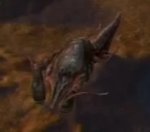| Makara | |
|---|---|
 Alien Melee Sea Unit in Beyond Earth | |
| Moves | |
| Base Unit Strength | |
The Makara is an alien species in Civilization: Beyond Earth introduced in the Rising Tide expansion pack.
It is a colossal, lobsterlike alien. It is the only known amphibious alien species that can move through both sea and land, and it boasts 28 combat strength. All of this makes it a good unit to leash for Harmony players: amassing a small army of them makes it easy to capture any city.
 Movement: 2 (1 if on land)
Movement: 2 (1 if on land) Strength: 28
Strength: 28
Civilopedia entry
Astacopsis Choanae
Despite being designated as a member of the order Decapoda, (along with crabs, lobsters, and the “ripper” species of this planet) Astacoposis Choanae, better known as Makara, are much larger than any earth species of this classification. This hulking, semi-terrestrial crustacean appears to follow a unique evolutionary path.
Much like earth crustaceans, Makara are able to survive on land because of the cavity at the base of their bodies in which their gills are stored. This prevents desiccation while out of water, and allows the creature to venture away from the sea. Unlike Earth crustaceans, Makara have developed a way to continue breathing air on land. The large holes on the front of their heads behave somewhat like the base of the human nasal cavity. However, Makara are unable to force air into their circulatory system using a difference of pressure, as humans do. Instead, they use constant head movement to force air into these cavities, allowing them to “breathe.” Somewhat like sharks, they must continue moving in order to breathe, though it is not necessary in the water. For this reason, Makara are significantly slowed on land, because of the need to move up and down.
Makara are able to use their terrestrial capabilities to escape predation, obtain food, and find new territory. As solitary creatures, Choanae are not fond of sharing space with others of their species, and will cross land to find new areas of water. Protecting their territory is generally seen as the reason for makara aggression toward humans, as they seem to live off of a non-predatory diet, relying on grazing and scavenging rather than hunting.



